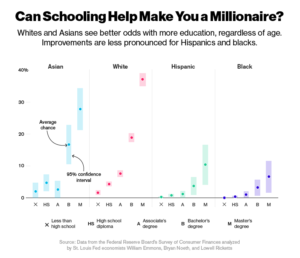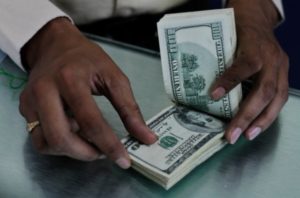Many white Americans like to believe the United States is a country with a level playing field, where everyone has a fair chance of making it. But a recent Bloomberg article states that race has a lot to do with your economic success. Bloomberg gathered data from economists at the Federal Reserve Bank of St. Louis. Writer Victoria Stilwell also posed the question: Would it be possible to calculate the odds of being a millionaire for anyone in the U.S., based on age, education and race?
The economists, who had already conducted extensive research on the subject, found that race plays a significant role in an individual’s earning power.
“It’s a false narrative to say race doesn’t matter in the United States,” said William Emmons, a senior economic adviser at the St. Louis Fed. “It demonstrably does in the results we keep coming upon.”

The researchers found education increases an individual’s earning potential. But they also found that a college education only increased a Black person’s chances of becoming a millionaire by 1 percent.
Interestingly enough, the economists found that a white high school graduate had about the same odds of being a millionaire as a middle-aged, Black graduate degree holder. This is not new information. Many studies have showed that Black people who possess degrees from top-notch universities still have high levels of unemployment. White high school graduates have better employment rates than Black college graduates. This calls into question the value of expensive college degrees. If Blacks are spending small fortunes on college education and not improving their job prospects, they maybe looking at things the wrong way.
Former finance professor Dr. Boyce Watkins encourages Black people not to get caught up in the “corporate plantation” and create their own businesses.
“We have to get rid of the lie which says that going to school will guarantee a black man a good job,” said Watkins on his website Financial Juneteeth. ”The right kind of education is valuable, but you’re still going to be Black.”
Many other Americans are beginning to question the value and cost of college education. According to U.S. News & World Report, a study of 2,000 graduates found more than half believed recent college graduates will see lower returns on their education investment than 10-15 years ago.
Emmons said that while the information might be depressingly familiar, it is still useful. He said it was important lawmakers understand the underlying issues if they are going to pass policies to address inequality.
“A lot of what people talk about as responses to inequality of this sort or that sort— they’re probably not going to make much difference given that these underlying factors seem to be so powerful,” Emmons said.
He added that the research shattered the myth of everyone starting out equal.
“We all come out in the birth lottery with different endowments,” Emmons said. “Starting from that point, what can you do to move yourself in a direction you’ll be happy with? That’s what we’re really trying to get at.”


